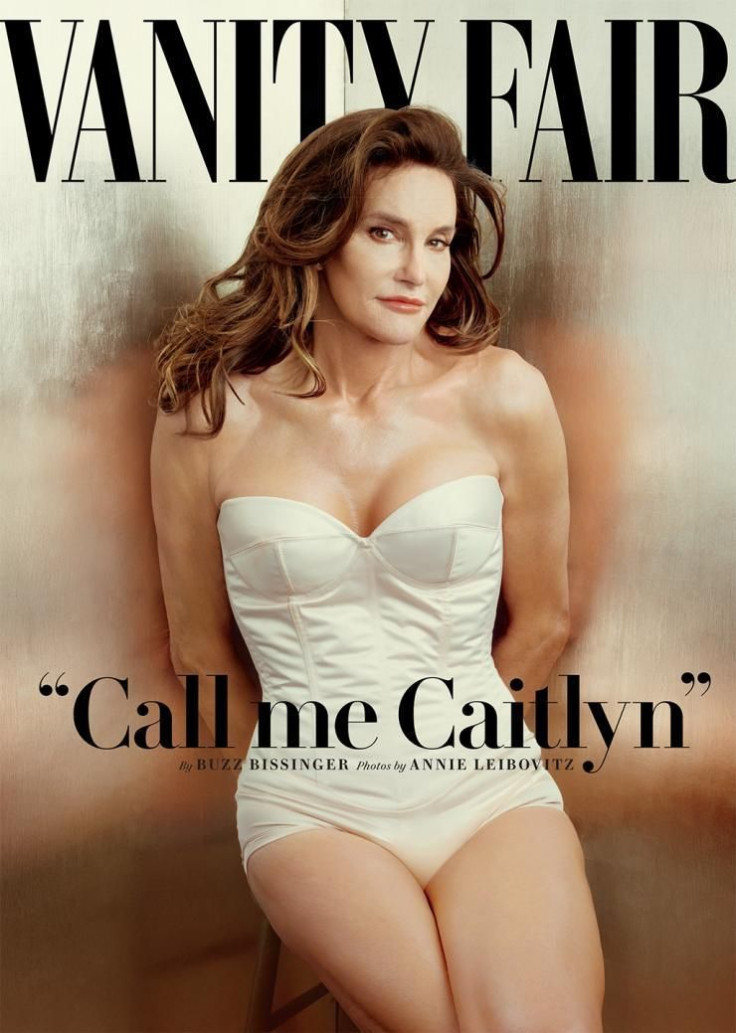Caitlyn Jenner Transgender Language Guidelines Spark Backlash; Accusations Of 'Trans Orwellianism'

Caitlyn Jenner's "Call Me Caitlyn" Vanity Fair cover was, for some people, an occasion for celebration. Many feted her on Twitter and in blog posts as "brave" and "beautiful," and LGBTQ media watchdog GLAAD sent out a style guide to journalists on suggested language to use to avoid "common mistakes and clichés" when talking about transgender people.
But the Internet's Caitlyn Jenner group hug didn't last long. Nickelodeon star Drake Bell tweeted (and possibly regretted tweeting) "Sorry...Still calling you Bruce," and Tuesday, Brendan O'Neill of the conservative British journal the Spectator penned an arguably trollish piece whose headline was its argument: "Call Me Caitlyn or Else: The Rise of Authoritarian Transgender Politics," with catchphrases like "Jennermania" and "trans Orwellianism" to describe GLAAD's language guidelines.
Authoritarian Or Good Manners?
But are GLAAD's media guidelines, rather than similar to a decree issued by a totalitarian government upon pain of punishment (per O'Neill's hyperbolic comparison), simply a matter of good manners?
The GLAAD guidelines include basic tips such as using "she" as a pronoun, "transgender" as an adjective rather than a noun (too objectifying), and minimizing references to "Bruce Jenner." But perhaps what is most difficult to absorb about the guidelines, particularly for people who don't understand what transgender is, is the request to "avoid male pronouns and Caitlyn's prior name, even when referring to events in her past."
The example they provide: "Prior to her transition, Caitlyn Jenner won the gold medal in the men's decathlon at the Summer Olympics held in Montreal in 1976."
O'Neill reads this as "borderline Orwellian ... a rewriting of history, a memory-holing of old inconvenient facts."
Well, not exactly. For transgender people, their anatomy is not destiny, and may be a "fact" of their body, but it does not determine the gender they identify with. GLAAD's request that journalists respect the transition and avoid focusing too much on a before-and-after narrative and instead on the gender the person identifies with is a form of respect. Do we need to understand the "why" of transgender -- that the very definition of "woman" and "man" is called into question for transgender subjects, and that "truth" doesn't reside in anatomy -- to write respectfully of transgender people?
Call Me Caitlyn
For Mara Keisling, a transgender rights activist and founding executive director of the Washington, D.C.- based National Center for Transgender Equality, you don't need to understand gender theory or even what transgender is to honor the request. Although it's not necessary, she does think it would probably help to know someone who is trans, and then respect their preferred pronoun, much as you would call someone "Bill" instead of William if he asked.
"When someone knows a trans person, like my parents know me, it's a lot harder for this nonsense to come up," Keisling told International Business Times, referring to O'Neill's "trans Orwellianism" accusations. "If Brendan was trans himself or his father or daughter came out as trans, he would learn instantaneously; if he had a heart and brain, he would just get it. "
"Recent polls show that only 8 percent of Americans say they know someone who is trans, compared to nearly 90 percent who say that they know someone who is gay, lesbian or bisexual," Dani Heffernan, senior strategist, transgender media, at GLAAD, told IBTimes. "GLAAD created our tip sheet for reporting on Caitlyn Jenner to help journalists tell her story fairly and accurately, without contributing to harmful stereotypes about transgender women."
When asked to react to O'Neill's claim that the guidelines were censoring free speech, Keisling replied, "I don't get it. William Jefferson Clinton told everybody, 'I want to go by Bill.' They had to fight to get his name on ballots. We got through that. Everyone's comfortable calling him Bill. But the first time someone says, don't call me 'William' call me 'Karen,' it's some kind of existential crisis."
Certainly journalists are still free to use "he" when referring to Jenner -- and news outlets like Fox News are in fact doing that -- but they might be called out on it. As Xeni Jardin of Boing Boing wrote to preface her reposting of the guidelines, "Everyone's gonna be talking about her [Jenner] today. Here's a guideline from GLAAD on how not to be an a--hole about it."
Linguist Weighs In
“Gender is for all of us the bottom line of our sense of identity: from a very early age, the question of who we are and what we can and should do depends on whether we have learned in early childhood that we are a girl or a boy,” says Robin Lakoff, professor emerita of linguistics at UC Berkeley.
“Therefore any interference in that identity is scary and people often respond to it as they respond to other more overt kinds of threats: e.g. by excluding or bullying those who do not fall neatly within the lines.”
Lakoff told International Business Times that the GLAAD media guidelines for writing about transgender people and the Spectator response reminded her of the 1950s and Southern politicians and their constituents who didn’t want to stop using the n-word – or start using “Negro,” which was polite at the time.
“We hate being forced to adapt our language to new social rules!” Lakoff said. “The idea that you might have to shift your pronouns to reflect how those you're speaking of and to want you to think of them/others is scary -- because it forces you to acknowledge every time you do it that gender is fluid and in flux."
* This article has been updated to reflect additional input from Dr. Robin Lakoff.
© Copyright IBTimes 2024. All rights reserved.






















